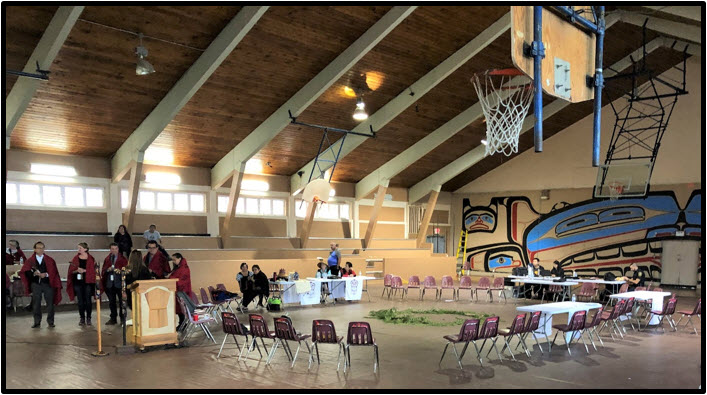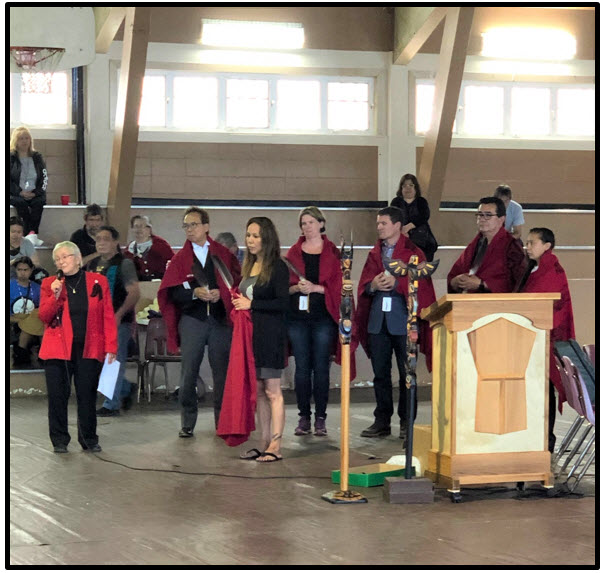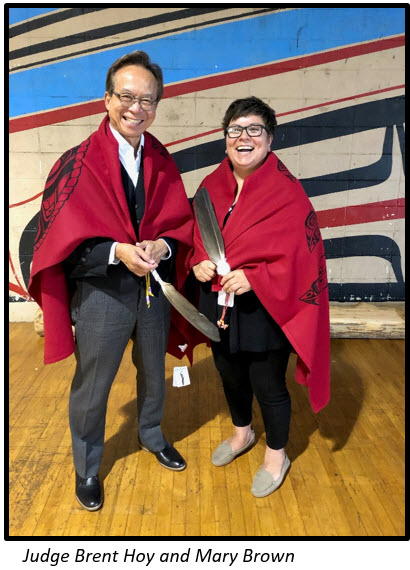The Provincial Court of BC has been holding court in Bella Bella, Klemtu, and Bella Coola on BC’s Central Coast for many years.
Located on the mainland, Bella Coola is the home of the Nuxalk First Nation. The Campbell Island community of Bella Bella is home to the Heiltsuk First Nation. The Kitasoo First Nation’s home is Klemtu, north of Bella Bella on Swindle Island. They are three of the communities the Provincial Court serves with a circuit court – a judge and court team who visit the community at regular intervals and set up a courtroom in an available building to conduct court proceedings. Judges are assigned to a circuit court for several years so they can learn about the communities they visit and provide consistent decision making, applying restorative justice principles and drafting court orders that are sensitive to local circumstances.
When consulted during the coronavirus pandemic, remote communities asked that the circuit court members not to attend in person in order to avoid the risk of introducing COVID-19. The Court has therefore been dealing with cases from those communities by telephone and when available (as in Bella Bella and Bella Coola), by video using an existing hard-wired system.
On May 22, 2020, technology moved the Court a step further when Judge Brent Hoy conducted court in Bella Coola using Microsoft Teams. The judge and lawyers dealt with criminal and family matters remotely in a virtual courtroom on this platform.
Judge Hoy said, "Access to justice has just been dramatically enhanced with the innovative use of new technology.” One law firm that participated tweeted, "Just finished participating in the first @BCProvCourt live on record, court clerked proceeding using @MicrosoftTeams. Move over sliced bread: your day has come and gone. Great experience."
In simpler pre-pandemic times last summer Judge Hoy decided that a Bella Bella sentencing hearing in a case with significant community interest required a “circle sentencing” – a type of hearing that encourages community input and is in keeping with Heiltsuk Nation traditions. With the agreement of everyone involved, arrangements were made for the hearing to proceed in this manner in the community gymnasium on July 16, 2019. It was an elaborate, tradition-filled event that included drummers, songs and ceremonial robes.

Chairs in the sentencing circle
At the end of the sentencing, the community held a luncheon to which everyone was invited. Those attending included Marilyn Slett, Chief Councillor of the Heiltsuk Nation, and other elected representatives, Elders, hereditary chiefs and community members. After the meal, Pauline Waterfall, an Elder and recipient of the Order of BC, officiated at a ceremony in which several community members were honoured by being blanketed – presented with a ceremonial blanket in recognition of an accomplishment or contribution.
In describing the event, Judge Hoy says, “What occurred next was completely unexpected as she asked me to come forward! I was caught completely off guard.”

Blanketing Judge Hoy, Ms. Waterfall welcomed him to the territory of the Heiltsuk Nation and thanked him for giving its members the opportunity to express themselves. She said the community appreciated the kindness and respect he afforded them.
Judge Hoy in turn thanked everyone for contributing to their community and commented on the importance of ensuring all voices are heard. He reports, “Personally, it was extremely gratifying to have had such a positive impact and to receive acknowledgement for our role as judges in this community.”

One of the strengths of the community in Bella Bella is the Heiltsuk Nation’s successful Restorative Justice Program. At the ceremony, Mary Brown, the Program Director, was honoured as an indispensable part of the community’s success in reducing recidivism.
For more about the Bella Bella, Bella Coola and Klemtu circuit court, see:
Bella Coola Circuit Court gets warm community welcome
Circuit Courts: serving remote communities by plane and boat

